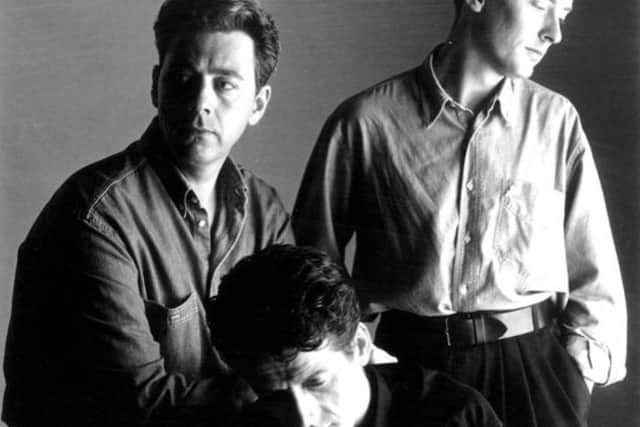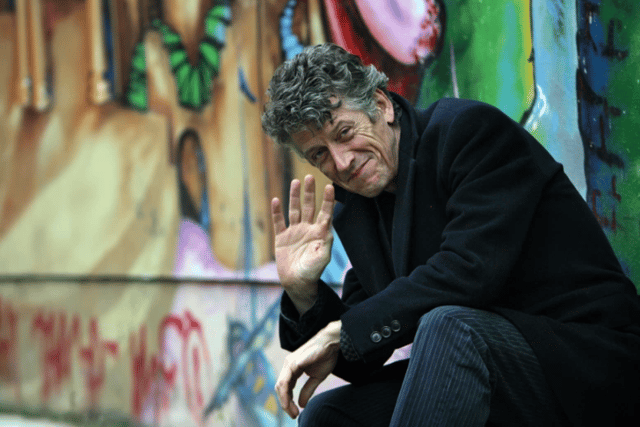Interview: Ken Sweeney on Glasgow and the source of The Blue Nile
and live on Freeview channel 276
In November 2014, the MTV Europe Music Awards were held at The Hydro. Irish journalist Ken Sweeney was flown over to cover the glitzy proceedings. He was delighted. No-one on the bill for the main show particularly caught his attention - “I can’t remember who played, you can Google them” - but this was an opportunity to tread the streets of a city he recognised from the songs of The Blue Nile.
It was the first of a series of visits that led to him recording a radio documentary on the band he had first listened to when he was a young musician, living away from home in London.
Advertisement
Hide AdAdvertisement
Hide AdJohn Douglas, husband of Eddi Reader and member of The Trashcan Sinatras describes the programme as “beautiful, respectful, probing and informative”. It is all these things. A delicate examination of an enigmatic band, told mostly through the words of lead singer Paul Buchanan and keyboard player PJ Moore.
Ken knew two things when he arrived in Glasgow: he wanted to see some of the places connected to the music of The Blue Nile, and that the band were here in the city.
“I just wanted to go to Glasgow because since I was in my late teens I was in to The Blue Nile and I wanted to see what Glasgow was like. I had some contact with Paul Buchanan. I sent an email to someone who had set up the interview with him about two years before. I said, “listen, I’m in Glasgow, I’m a big Blue Nile fan, is there any chance I could meet up with Paul?” I didn’t think I would get anything back from it.”
“Then I got an email saying Paul would love to meet up. We met in the West End, the area that they are associated with. Then I also ended up hooking up with PJ Moore. I was telling him I was going around the city, looking for these places associated with their music.”
Advertisement
Hide AdAdvertisement
Hide AdBy the time he left, Ken was enchanted by Glasgow, it’s architecture and the way it resonated with the music he grew up listening to. He also knew there was a story here, one that he would be happy to tell.
“I had an early chat with [Irish broadcaster] RTE about it and when they heard the interviews I had done with Paul and PJ they fully came on board.”
“I’m delighted that RTE went for it because The Blue Nile had a special relationship with Ireland and lived over here in Dublin for a while. Tom Dunne talks about a gig the band played in The Gaiety Theatre which was so euphoric and romantic, people got engaged on the night.”
The Blue Nile in Glasgow
“Paul Buchanan brought me up to the house in Kelvingrove where they made the first record and he was standing outside and he was just remembering.”
Advertisement
Hide AdAdvertisement
Hide Ad“They kind of told me their story. No one has really got them out to talk about it.”


Part of the focus of the documentary, which you can listen to below, is the band’s relationship with Glasgow, how it informed their songwriting and the music scene that they emerged from. Equally interesting is the relationship Glasgow has with The Blue Nile. Ken gets animated when he starts to talk about it.
“One of the bits I left out of the documentary was.. I did vox pops outside the concert hall on Buchanan Street. I was asking people if they had heard of The Blue Nile and they said no. I was saying to them, hang on, they are from Glasgow! The band played the first night in that venue behind you! They opened it! People were very nice and helpful but they had just never heard of them. For me, it was like going to Belfast and finding no-one had heard of Van Morrison.”
“They are so celebrated. The 1975 have had number ones in the UK and the US, at the start of the documentary you hear the lead singer say he is obsessed with The Blue Nile. I think we’ve woken up a sleeping giant with this documentary and the reaction that it’s had.”
Advertisement
Hide AdAdvertisement
Hide AdThe documentary has been shared across Scotland and across the world, by celebrities, musicians, fans old and new. The fact remains that The Blue Nile are an intangible presence in their hometown. Those who know them, love them with an enduring passion. Those who don’t, or who are less familiar, fail to make the connection.
Invariably they are either the first name when you ask someone about Glasgow bands, or they are not mentioned at all. There’s all kinds of reasons - they only produced four albums over a 20 year period, won critical acclaim without conquer the mainstream. Not that they had any interest in doing so.
Why are they not more celebrated in Glasgow? We chatted about this for a while. Our own theory is that there is a vague perception in Glasgow that the band’s music is about London or Los Angeles or some other imagined cinematic city. The Blue Nile seemed a bit too ethereal to be writing about Sauchiehall Street or Byres Road.
The documentary sets the record straight. Tinseltown in the Rain is about us.


Advertisement
Hide AdAdvertisement
Hide AdKen says “The Blue Nile are the best of people. Typical Glasgow people. There’s a funny moment where I’m standing with PJ Moore in the West End and I say to him “it’s raining” and he says “did you think we made it up?”
“I was in a taxi with Paul Buchanan, I dropped him off and then went on to where I was staying. I got talking to the taxi driver who was asking what I was doing over here. I explained I was doing a documentary on The Blue Nile and he started saying “oh, they live over in America don’t they”, I said “no, the lead singer just got out of your taxi” and he goes “that was never Paul Buchanan! Does he not date Rosanna Arquette?”
“They are back among you. They are just around.”
“I was too much of a fan when I was making the documentary, asking Paul Buchanan very directly about particular songs, like An Ordinary Girl. He was telling me a wonderful story about the people in Glasgow, it’s my favourite story in it. It was about the couples who used to meet outside the BHS store on Sauchiehall Street before going on a date and he would walk past them. He could see their expectation and what they hoped. Those stores were closing down while I was there and I found that very poignant.”
“The Blue Nile stayed in Glasgow. They made A Walk Across the Rooftops and people like Peter Gabriel went bananas over it. Paul Buchanan said life changed very little when that was happening, they were still at home. Five or six years later Hats comes out and they sign a new deal, so they moved. But they came back to Glasgow after they recorded Peace at Last. They were recording and writing there when they recorded their last studio album High. The connection with Glasgow is key.”
Advertisement
Hide AdAdvertisement
Hide AdThe Blue Nile might not get a regular playlist slot on Radio Clyde and may not be as celebrated as others in Glasgow’s pantheon of bands, but they have had an enduring impact on music. Part of the In Search of The Blue Nile documentary deals with the production of their second album, a process that took longer than expected. The band simply didn’t finish the album until they thought it was ready. Ken thinks this gets to the crux of The Blue Nile story.
“We talk about the question of whether you hold off releasing a record if you don’t think it’s finished. Did that damage their career, did they blow it? We’ve got someone talking about the fact that Paul Buchanan was the only one who was invited to do the Bowie tribute concert. There was no sign of Nik Kershaw or Howard Jones or Duran Duran. It was Paul. That’s why we are celebrating them so much. Their music has lasted. The engineer I was working with on the documentary, he had never heard of the band and is now totally in love with them. What I wanted to do was remind people and bring in a new audience. People are still hearing it.”
“They held their own. They are bookish guys, they are musicians but they stood their ground. Grown men were shouting at them, bullying them, saying that they owed them money, but they still made the records they wanted to make.”
Since making the documentary, Ken has become something of an evangelist for our city. “I hope more people visit Glasgow. I don’t want to hear again that people have been to Edinburgh several times but they’ve never been to Glasgow. Glasgow is a brilliant city.”
Advertisement
Hide AdAdvertisement
Hide AdPaul Buchanan has released music as a solo artist. PJ released new music under the PJ Moore and Co banner. In the age of musical rapprochement, what hope then for more music for The Blue Nile? Ken has said no before we finish asking the question. He explains:
“I think that we all have pals from our 20s, our bosom buddies. We got drunk with them, we fell out of gigs with them, they were our best, best mates. As time goes on, we can never have that friendship again. Things get in the way. No-one can really go back to the friendship of their 20s.”
“That, I think, is the story of The Blue Nile. PJ has talked about how they began to make each other nervous in the studio after a period of time. Paul Buchanan says they started off as a bunch of guys, with synths and guitars, in an attic, banging on the floors. Then suddenly lawyers get involved and life becomes complicated.”
“I’d love it to happen. Hand on my heart, I can’t see it. I was trying to get the wheels in motion but I would say, from what I have learnt, on air and off air, there’s no chance.”
“The music is there though. It’s ours forever.”
You can listen to the documentary here.
In Search of The Blue Nile was first broadcast on RTE Radio 1.
Comment Guidelines
National World encourages reader discussion on our stories. User feedback, insights and back-and-forth exchanges add a rich layer of context to reporting. Please review our Community Guidelines before commenting.
